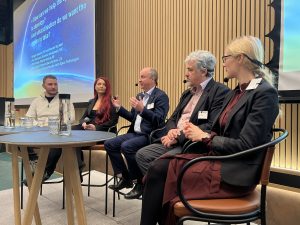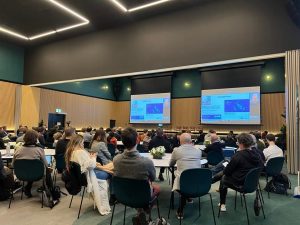In a fully booked conference room in Kiruna, members from the academia, space companies, enabling organizations and the public sector gathered for two days. The fourteenth Space Innovation Forum event was themed “The next frontier – the space sector in Norrbotten, tomorrow and beyond”.
The three work packages within RIT were presented by the project leaders and some of their members; academia and industry collaboration, Testbed Space, innovation support and cluster building. The keynote speaker the first day was Anna Rathsman and at present she is the Director General for the Swedish National Space Agency and appointed Chair of ESA Council. She has been in different leading positions for more than 30 years in the space industry and has a unique in-depth knowledge and experiences from several different parts of the business.
– I am so proud that we have the knowledge, the system, the competence in Sweden and not at least up here in the north. When we talk about space it easily becomes narrow – but when we get together, with all the knowledge within the sector and start cooperating and talk about space in a wider perspective then more and more companies and organizations can see the possibilities of space, says Anna Rathsman.
Trend watch and workshop
Day two focused on trend watch, with speakers as Luca Del Monte and Tomas Jonsson. Luca del Monte is a senior executive at the European Space Agency with strong background in policy making, strategy development and management of deep space tech projects. He is currently responsible for the ESA Commercialization Department, with the goal is to make Europe one of the greatest places in the world to launch and grow global space companies that make sense for our future.
– Private investors are an important element of this new stakeholder group in the new space revolution. Our priority is to raise awareness in that community and connect them to the new space industry. Innovation happens when you bring together different actors from industry, academia and institutions and get them to work together, as they for example do in the Space Innovation Forum, says Luca del Monte.
The importance of close collaboration between everyone who has connections to the space industry was a common theme among all the presenters on stage. It is also something that is confirmed in the study “Space Capacity Building” presented during the conference. The study will work as a decision basis for further development of the space region. It has helped to identify the strengths but also areas within the core space value chain in need of development.
– This forum is well established and an important meeting point for stakeholders within the space region. We have succeeded to attract interesting speakers, both national and international, which is a clear sign that the external space establishment is interested in collaborating with us, says Johanna Bergström Roos, Project Manager RIT and initiator of Space Innovation Forum.
Cooperation and the development of the space sector in northern Sweden was also the theme of the workshop that tied the conference together towards the end, before the participants went out to Space Campus to listen to Women in space – where Ella Carlsson, Chief of Space Capabilities and development, Swedish Air Force, shared her exciting career in the Air Force, the academia and the space industry. The entire conference ended with an appreciated tour of Space Campus were The Institute of Space Physics (IRF), Luleå University of Technology (LTU) and EISCAT are located.
Here you will find presentations from the event


